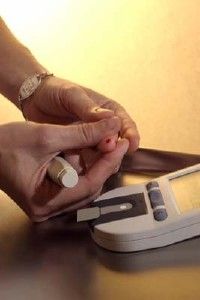Monitoring your blood sugar is a vital part of the diabetes management process, and frequent self-monitoring is the key to successful diabetes care. Testing your blood sugar, also called glucose, allows you to adjust your food, medication, or activity level so that you can keep your blood sugar level within a healthy range.
When blood sugar is too high, it's called hyperglycemia. If blood sugar levels remain too high for too long, there's a greater likelihood of serious short-term and long-term complications that affect the whole body. Low blood sugar, called hypoglycemia, can result in unpleasant symptoms or even dangerous complications.
Advertisement
Tightly controlling blood sugar levels, however, has been shown to prevent, reduce, or even reverse some of the long-term complications associated with diabetes by up to 60 percent. Tight blood sugar control depends on frequent monitoring.
Testing your blood sugar multiple times each day can help you understand blood sugar patterns and fluctuations associated with certain foods or alcohol, specific medication doses, your level of activity, illness, and stressors at home or work. With this information, you can then figure out what works best for you -- food, exercise, medications, or insulin -- to keep your levels as close to normal as possible. If you don't test your blood sugar levels, or test only infrequently, you'll never be sure whether your diabetes is really controlled.
For more information on diabetes in general, try the following links:
- To learn more about diabetes in general, including diagnosis, causes, symptoms, and treatment, visit our main Diabetes page.
- Our main Type 1 Diabetes page will tell you more about this form of diabetes, commonly called, "juvenile diabetes."
- To find out more about type 2 diabetes, which has reached the level of national health epidemic, go to our main Type 2 Diabetes page.
This information is solely for informational purposes. IT IS NOT INTENDED TO PROVIDE MEDICAL ADVICE. Neither the Editors of Consumer Guide (R), Publications International, Ltd., the author nor publisher take responsibility for any possible consequences from any treatment, procedure, exercise, dietary modification, action or application of medication which results from reading or following the information contained in this information. The publication of this information does not constitute the practice of medicine, and this information does not replace the advice of your physician or other health care provider. Before undertaking any course of treatment, the reader must seek the advice of their physician or other health care provider.
Advertisement
